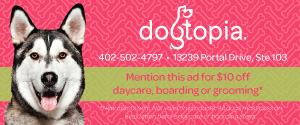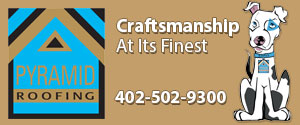- Do you subscribe to Dharma Dog Training’s Newsletter? You should.
- A Unique Campaign from The Humane Society of the United States
- Rabid bats in Omaha- Stay safe, prepared with these tips
- Springtime Activities in Omaha
- Mill Dog Monthly from Bailing Out Benji
- World Spay Day, Legislative Alert in Nebraska
- Attend the Nebraska Rescue Council’s monthly meeting this Saturday
- Five Hard-to-Ignore Reasons to Adopt!
- Paws in Pink to Benefit Breast Cancer Foundation
- VCA, Inc. Acquires MidWest Vet Specialists from Kansas State University
Dog Skin & Coat Care: Everything You Need to Know

A smooth and shiny coat means more to man’s best friend than a beautiful physical appearance. Although we love them in any shape or form, the condition of our dogs’ skin and hair may be giving us more signs about their overall health than we initially thought. That is, in fact, where many important health problems show their symptoms; even a common seasonal allergy that causes humans to sneeze and cough primarily affects dogs’ skin, making them itch, bite and paw at their bodies incessantly. So it’s always a good idea to keep a close eye on your pooch’s skin and coat to keep him healthy and happy, just like he deserves!
1. Genetics Matter
Depending on the breed of your dogs, you first need to identify their coat type, as their grooming needs will vary accordingly. Coat types range from smooth to wiry, single to double, short to long and silky. It’s a common misconception that shorter-haired dogs won’t require any skincare or grooming—there are numerous care tips recommended for any kind of dog to keep them in optimal health.
2. Bath Time
How frequently your dog needs some freshening up will depend on his daily activities and environment; but experts recommend once or twice a month as a good rule of thumb. Some dogs readily jump in any body of water, while others require some patient training to get used to being bathed. In any case, a combination of regular baths, maybe a quick dry shampoo fix in between, and a daily brushing routine will rid your best friend of the dead or matted hair, dust and debris in her coat, keeping her clean and fresh at all times.
One other thing to consider is the quality of the products you use; try to choose a natural shampoo containing minimal amounts of hazardous chemicals, and keep in mind that the pH level of dog’s skin is different from humans, so always stick with products intended for our furry friends.
3. Skincare Routine
Just like yourself, your dog’s skin is the largest organ in her body, and it’s susceptible to a number of ailments. You might realize pimples, rashes, hot spots or dandruff on her skin, or she might be prone to excessive sebum. In any case, the first thing you want to do is to make sure these are not symptoms of an underlying health condition—your vet may assess the situation during a simple check-up, or want to run some further tests.
If everything else seems ok, there are various products you can use to help your doggy get rid of the itches and discomfort; you can try home remedies like oatmeal baths, coconut oil or diluted apple cider vinegar sprays, or go professional with a dog-specific conditioner or a soothing lotion for dry skin. You read it right; dogs enjoy a complete skincare routine too, and giving them just an occasional shower with a garden hose and dishwasher soap is, luckily, a thing of the past.
Neem oil is a popular product that soothes skin and acts as a layer of protection.
4. Haircuts
Especially if your dog has long hair that keeps growing like human hair—as is the case with Poodles and Yorkshire Terriers among others—frequent trips to the groomer might be in store for you to maintain their amazing looks. Contrary to popular belief, though, dogs don’t necessarily benefit from shorter hair during the summer; their coat actually protects their skin from getting sunburnt, and insulates them against the heat by allowing for air circulation.
Again, consistent brushing during shedding season may be enough for Fido to get rid of his thick undercoat. If you’re eager to trim your dog at home though, watch some educational videos first in order to avoid uneven cuts and clipper burn.
5. You Are What You Eat
So avocados, chia seeds and turmeric are on your own shopping list, but you still give Rover store-bought kibbles or the leftovers from last night’s dinner? It may well be the cause of his dull fur and skin issues, as diet plays a huge role in the overall well-being of dogs. They need essential fatty acids for skin and coat health, and their process of metabolizing these compounds are not the same as humans.
To ensure that your dogs eat a complete and balanced diet, you can read the labels of their food carefully and make wiser choices, switch to a home-cooked diet under your vet’s supervision, or boost their meals with supplements like fish oil or fresh sardines. No matter which path you take, make room for some trial and error, and always keep your pooch hydrated by offering him a full bowl of fresh, clean water.
Not Just a Walk in the Park
Owning a dog comes with many responsibilities, and keeping their coats clean and healthy is only one of them. As there are many factors out there that might affect the condition of your pup’s skin, it’s important to stay informed and seek professional help whenever you suspect something doesn’t seem right. Pest control, for example, is a whole wide topic that’s directly connected to skincare and health—so always do your research and make sure you’re up for the task, both mentally and financially, before you decide to commit to a lifetime companionship filled with belly rubs and wagging tails.
Latest News
-
Join Us at Pick A Pooch 2025: A Fun-Filled Weekend for the Whole Family
A Fun-Filled Weekend for Pet Lovers and Families Alike Mark...
- Posted 1 year ago
- 0
-
Beardmore Presenting Sponsor At This Years Pick-A-Pooch event
🐾 We are thrilled to announce that Beardmore Subaru is...
- Posted 1 month ago
- 0
-
How Having A Pet Can Change Your Life
Having a pet can open your heart in ways that...
- Posted 3 months ago
- 0
-
How To Improve The Life Of Your Senior Pet
Do you have an elderly fur baby and want to...
- Posted 3 months ago
- 0
-
Springtime Activities To Enjoy With Your Furry Friends
Are you preparing for warmer weather and want some ideas...
- Posted 4 months ago
- 0
-
Pros And Cons Of Microchipping Your Pets
Have you considered whether your pets should be microchipped and...
- Posted 5 months ago
- 0
-
The Best New Fun Toys For Dogs And Cats
The Best New Fun Toys For Dogs And Cats Did...
- Posted 5 months ago
- 0
-
Heartfelt Ways To Show Your Pet You Love Them
Did you know there are more ways to show your...
- Posted 6 months ago
- 0



















You must be logged in to post a comment Login